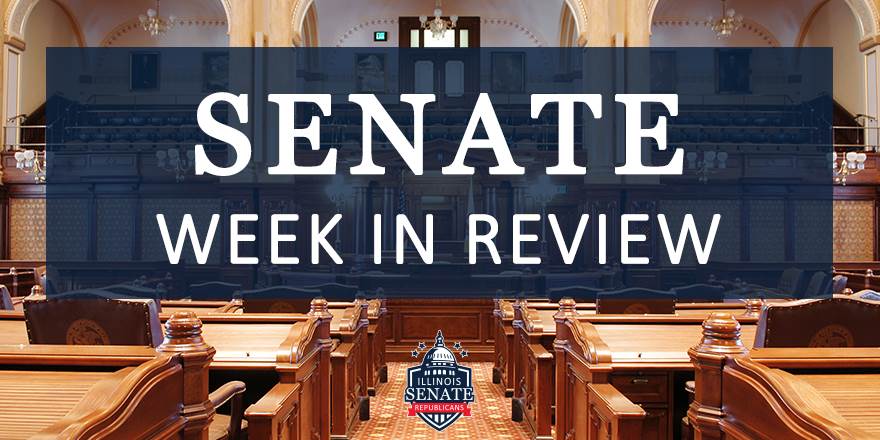SPRINGFIELD – Budget discussions continue as legislators prepare for a return to Springfield next week.

Also, some positive news for Illinois’ jobs climate as the Blue Collar Jobs Act was reinstated after a years-long freeze on the program. Following calls from Senate Republicans for its return, businesses can now begin applying for the job-creating tax credits.
Lastly, many downstate Illinoisans will see some relief on their electric bills as new rates were announced late last week. This comes as the Illinois General Assembly just passed a measure to end the ban on the construction of nuclear power plants with the goal of increasing the amount of clean, reliable, and affordable energy to the grid.
Budget negotiations continue

Legislators return to Springfield next week as discussions continue on the budget. Currently, the Governor’s proposed budget stands at almost $50 billion, an increase from the previous year. Meanwhile, revenue is slowing as pandemic-era federal funding is drying up and a recession looms.
A major point of contention among the Majority Party seems to be the ballooning $1.1 billion free healthcare program for undocumented immigrants. That estimate was recently released, which is a drastic increase from the original Fiscal Year 2024 estimate of $220 million.
State Sen. Jil Tracy (R-Quincy) says she worries this extremely expensive program for non-citizens could ultimately squeeze out other budgetary priorities, including fully funding services for citizens with developmental disabilities, which have been underfunded by half a billion dollars.
Blue Collar Jobs Act Construction Tax Credits

Following calls from Senate Republicans, the Illinois Department of Commerce and Economic Opportunity (DCEO) opened the application process of the Blue Collar Jobs Act (BCJA) for eligible companies. BCJA seeks to bring good-paying jobs to Illinois through a series of income tax credits for qualified capital investments in the construction of new or improved property.
The program was originally signed into law as part of the bipartisan budget negotiations in 2019 but was frozen prior to its implementation in 2021 by Gov. JB Pritzker. Sen. Tracy applauds the reinstatement as it will help to rebuild Illinois’ economy and provide more job opportunities to Illinois workers.
The Blue Collar Jobs Act provides $20 million in incentivizing tax credits attributable to the wages paid to construction workers on eligible construction projects. Eligible companies include those located in an Enterprise Zone or a River Edge Redevelopment Zone, companies designated a High Impact Business, or companies with an agreement under the Economic Development for a Growing Economy (EDGE) Program.
For more information, the DCEO’s website lists the requirements for the various construction credits, as well as the application process itself. The DCEO will also host a technical assistance webinar regarding the BCJA program application and processes June 26 in the afternoon. This program will be virtual and participants can RSVP online.
Illinois’ energy outlook sees some improvements
Last week, Ameren Illinois filed new electric rates with the Illinois Commerce Commission following the Midcontinent Independent System Operator’s (MISO) seasonal planning resource auction.
Last summer, downstate consumers were hit with a dramatic increase in electric rates, resulting in many families paying over 90 percent more on their utility bills. The new rates announced last week fell to approximately 7 cents from approximately 12 cents per kilowatt-hour—still higher than what consumers were paying in May 2022, but a small step in the right direction for energy affordability for Illinois families and businesses.
While these rates take effect June 1, 2023, individuals who live in the Ameren Illinois territory but within a municipality or county that has entered into an aggregation contract won’t see a change in the rates on their bills until either their contract expires, or they opt out of the municipality’s contract. Aggregation contract rates vary per municipality.
The announcement of new rates comes as the Illinois General Assembly just took a major step in seeking to provide more clean, reliable, and affordable energy to Illinois’ power grid. Last week, the House of Representatives and the Senate approved a measure, Senate Bill 76, which would end the decades-long ban on the construction of nuclear plants and would allow for the creation of small advanced nuclear reactor plants.
Sen. Tracy says this legislation will position Illinois to be able to better capitalize on our state’s existing wealth of nuclear experts and knowledge to help fulfill Illinois’ clean energy demands.
